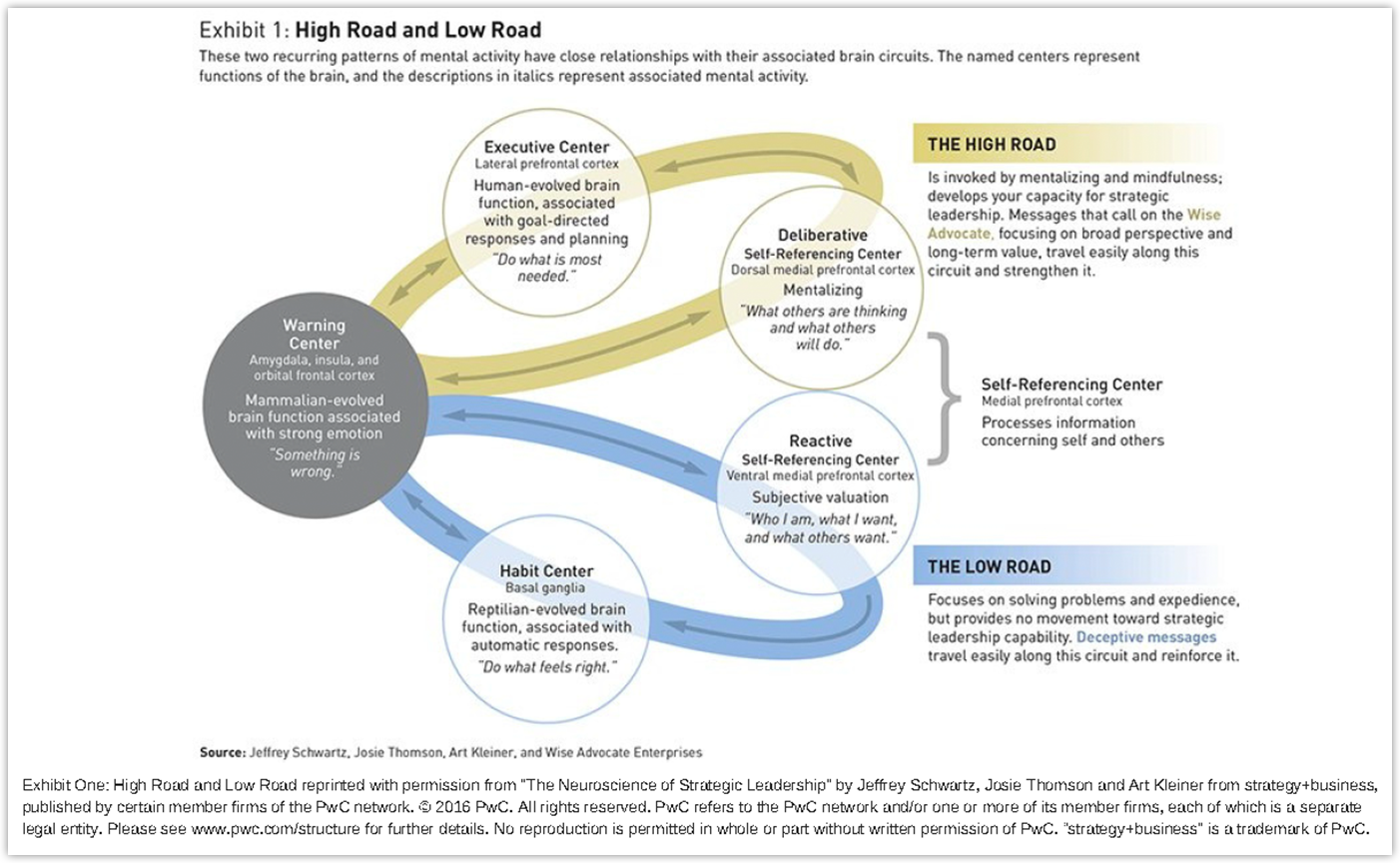The Wise Advocate: The Inner Voice of Strategic Leadership
The Wise Advocate: The Inner Voice of Strategic Leadership
That’s the title of my new book due for release in the coming months. It’s been a collaboration project since 2012 between myself, Dr Jeffrey M Schwartz, leading Neuroscientist on OCD and neuroplasticity at UCLA, and Art Kleiner, editor for s+b magazine. The book will be published by Columbia University Press.
This is a coming together of our work and specialisations in business strategy, neuroscience and coaching into one central space.
This body of work will essentially show and enable leaders how to access a profound and empowering resource that is available to us at any time, called the Wise Advocate.
Essentially, recent advances in neuroscience have enhanced our ability to understand the inner awareness that leaders often neglect.
Have you considered how potentially empowering it is to equip leaders from the inside out to make wise decisions and more effectively influence and collaborate with others?
We believe that the most powerful resource is that aspect of attention we call the Wise Advocate, which represents our approach to the practical application of mindfulness in the workplace.
The Wise Advocate is the voice within, the mind-oriented, dispassionate perspective of a clear-minded observer, helping you see yourself and your actions as others might see them. This inner voice may not be obvious to everyone, but it is always there.
How do we develop the capacity to tune into the Wise Advocate?
The interaction between mind and brain is central to the Wise Advocate hypothesis. The mind is active in a way that the brain is not. You can choose where to focus your attention, and your choices, made in the mind, will eventually affect the physical makeup of your brain. This phenomenon is called self-directed neuroplasticity.
When making a business decision, you are likely to focus your attention in one of two ways:
- If you’re making a deal or thinking about satisfying your needs or those of others, you’re probably on the Low Road. This pattern of mental activity involves desire, expedience, immediate value, rapid problem-solving and the need for relief. It’s a familiar path and has real relevance, especially in business.
- The other path is the High Road. When you reflect on your deepest long-term goals and how to achieve them, or when you ask and reflect on what people are thinking and what they’re likely to do, it triggers the High Road. When you take the High Road, you are listening to your inner voice, your Wise Advocate.
Recent research using brain imaging has demonstrated an important distinction between two brain areas in the upper and lower parts of the prefrontal cortex. The Low Road pattern of mental activity uses a functional center of the brain we term the Reactive Self-Referencing Center. This function is activated by questions like “What do I want, and what do others want?” “What’s in it for me, and what’s in it for them?” These kinds of tactical questions are described by neuroscientists using the term subjective valuation: Is it valuable, and is it relevant? These questions are typical of Low-Road thinking.

The High Road pattern of mental activity uses a functional centre of the brain we term the Deliberative Self-Referencing Center. This function is activated by questions like “What are others thinking, and what will others do?” These kinds of strategic questions are described by neuroscientists using the term mentalizing: What is he/she thinking, and what will he/she do? These questions are typical of High-Road thinking.
The essence of High-Road thinking is to consult the Wise Advocate and apply these reflections to yourself. For example: What am I thinking? What will I do next? What are my medium- and long-term goals?
One practical way for leaders to discover their own Wise Advocate is by learning to use the Deliberative Self-Referencing Center, which is activated by reflecting on what others are thinking and what future actions they might perform and applying that reasoning to themselves. This kind of mental activity is also profoundly associated with what is classically known as mindfulness (i.e., What am I thinking, what am I paying attention to, and am I attending to my Wise Advocate?) Mindfulness is a clear-minded outer perspective on your inner experience, sometimes described as a third-person perspective on a first-person experience.
During stressful times, leaders must pay attention to their emotional states, because those states will directly impact their capacity to focus their attention and make wise decisions.
Why is this important for strategic leadership development? Cultivating mindful awareness by consulting their Wise Advocate will place leaders on the High Road. Unless they apply effort, their brains will automatically push them toward the reactive responses of the Low Road, because the Low Road is largely controlled by the habit center. The habit center directs behavior in automatic ways that we are generally not consciously aware of, significantly constricting our capacity for adaptive strategic leadership, creativity and innovative practices.
When leaders focus their attention on the High Road of their minds, they will continually strengthen their associated executive brain circuits, giving rise to goal-directed responses and strategic planning. These circuits also play a key role in inhibitory control and self-regulation – the keys to delaying habitual behaviors and creating the capacity for truly strategic thinking and sophistication in leading others.
Over time, this practice gives them a greater facility for wise leadership, the kind of leadership that allows people to navigate large organizations with a Wise Advocate frame of mind toward seemingly impossible goals.
If you’d like to express your interest in being advised when the book is available for purchase, click here or fill in the form below.
If you’re interested in licensed trainings for your organisation, click here or fill in the form below.
If your career is at a cross roads and it’s time to reconsider your path, take a look at my new online learning program Career Transitions.
With love,

The Wise Advocate: The Inner Voice of Strategic Leadership
Express your interest here to be advised as soon as the book is available for purchase,
and/or your interest in licensing our work for implementation within organisations. My co-authors and myself will be available for presentations and workshops for organisations interested in exploring ways to cultivate Wise Advocate leadership. There will also be opportunity to license our programs soon.
The Wise Advocate: The Inner Voice of Strategic Leadership
Express your interest here to be advised as soon as the book is available for purchase, and/or your interest in licensing our work for implementation within organisations. My co-authors and myself will be available for presentations and workshops for organisations interested in exploring ways to cultivate Wise Advocate leadership. There will also be opportunity to license our programs soon.
Enlivened Teams, Resilient Workplaces
Whether it is a critical workplace event or project, dealing with the constant and rapid pace of change, or simply responding to the day-to-day challenging situations that we all encounter, personal resilience is the determining factor in who fails and who succeeds.
Build a resilient workplace by training managers in how to cultivate their own and others’ resilience so they know that when the going gets tough, they can lead with true grit.
If you are interested in finding out more, click here.
You Are Not Your Brain
Want to see how you stack on the Resilience Scale? Sign up and take my complimentary self assessment here.

